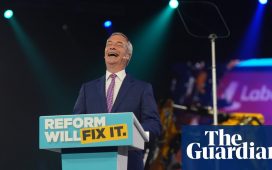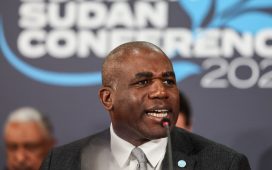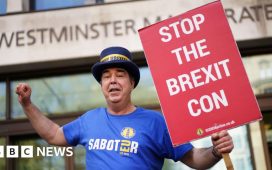Less than two weeks before local elections that some senior Tories fear could unleash another party meltdown and an attempted putsch against Rishi Sunak’s leadership, Downing Street had hoped that Friday’s prime ministerial speech on the weighty issue of welfare reform might finally begin to restore the party’s reputation for competent governance.
It was a potent sign of Sunak’s struggles in keeping his party on track that, soon after his speech had concluded, some of his MPs found themselves discussing whether or not one of their colleagues had deliberately intoxicated a friend’s dog. “How can somebody possibly get a dog pissed?” wondered one. “Bizarre.”
A senior minister was more despairing of the “utter madness” on display. “Do we really reflect society as a whole? I hope not for the sake of humanity.”
The drunk dog accusation was one previously thrown at now suspended Tory MP Mark Menzies. As one Tory wearily observed: “There have been so many other mad things that we’d forgotten that it happened.”
It is an allegation Menzies denies, along with new claims revealed last week that he had allegedly called a former aide at 3.15am asking for £5,000 to pay “bad people” who had detained him in a flat.
His bizarre case, along with days of former prime minister Liz Truss denouncing “leftists in the Conservative party’’ as she attempted to sell her new book, and more criticisms from Boris Johnson over Sunak’s lack of zeal for Brexit, ensured another week has gone by in which Tory discipline – once spoken of as the party’s secret weapon – has yet to reassert itself.
All this, despite the proximity of what could be a perilous set of local elections.
Both Labour and Conservative figures have also observed that the Menzies case in particular has served to overshadow attempts by the Tory party and the rightwing media to pursue Labour’s deputy leader, Angela Rayner, over allegations she might have paid the wrong amount of tax on the sale of her former council house before she became an MP. As a result, senior Labour figures have become more forthright in their defence of Rayner, even as Manchester police investigate the claims.
Labour, meanwhile, sees the last set of local polls before the general election as an opportunity to test its ability to delve deeper into Tory territory than it dared hope even a couple of years ago.
The party is concentrating fire on areas that will be critical in the general election, with the likes of Milton Keynes, Dudley and Thurrock all in its sights. But it also hopes to pull off surprises in some true blue heartlands.
“Byelections show that there are no ‘no go’ areas for Labour,” said Ellie Reeves, Labour’s deputy national campaign coordinator, citing the five contests Labour has fought in England in the past seven months, four of which it has won.
“Look at somewhere like Mid Beds, for example. There were a lot of people that were saying that we shouldn’t fight Mid Beds, that it wasn’t a seat that Labour had any chance of winning – it had no history of voting Labour, and we proved them wrong.
“In Wellingborough, we had a 28.5% swing, the second highest swing in a byelection since the second world war. That demonstrates people are switching their votes. A few years ago, it would’ve been unthinkable.”
While questions remain about the enthusiasm with which voters are embracing Labour – and some of the party’s most senior figures openly admit that Keir Starmer has had huge slices of luck along the way – Reeves insists there is some excitement among voters and hints that more is to come in terms of a bigger vision.
“When I’m out campaigning now, it feels much more like 1997 than any other period since then. You meet people that will say: ‘I have voted Conservative, but I don’t think I will this time,’” she said.
“People want reassurance on the economy, on the chaos that we’ve seen – but, yes, they do want hope as well. I think that once you set out those economic foundations, you can then go on to talk about, you know, the positive offer.”
after newsletter promotion
In recent days, party officials also believe that the chancellor, Jeremy Hunt, has delivered them an extra opportunity. In the week that one poll showed that the average age at which people are more likely to vote Conservative than Labour is up from 39 at the last election to 70 now, it thinks Hunt has blundered with an open-ended ambition to abolish national insurance contributions for employees.
Internal focus groups and polling have suggested it has increased fears among pensioners over what that means for the state pension, the NHS and for their children and grandchildren. It also raises the unfortunate comparison with Truss’s doomed mini-budget that Labour delights in bringing up.
There will now be a blitz of political ads and shadow cabinet appearances designed to exploit it. “Tory backbenchers weren’t happy with the budget – I think it was a panicked move,” said one senior Labour figure. “Liz Truss quite liked it, which is a good indicator that it’s a bad idea. Hunt hasn’t made any argument about how he’s going to do it.
“We will talk more about its impact on pensioners. We will do some things over the next few days to try and draw attention to it. And we’ll see what impact that will have on their voter coalition on 2 May.”
While early election rumours refuse to go away, fanned by a Labour hierarchy desperate for one to be called, there is a theory among Tory MPs that the possibility of a summer election is being used by Downing Street as a threat to keep unruly colleagues on their toes and in line.
One MP warned that there was a danger that angry colleagues could inadvertently trigger a no confidence vote in Sunak after the local elections. A vote is held once 53 Tory MPs submit a letter calling for one.
“There’s a version where, a little bit as happened with Theresa May, you accidentally trickle over the line of a confidence vote,” said a former minister.
Not all Tories are completely pessimistic, however. One influential figure, who self-identifies as an “incurable optimist”, said a solid performance in some key contests could steady the ship. “Almost everybody seems to be going about assuming they’re going to be really bad and I’m not at all sure that they are. There’s a very good chance that we hold the Teesside and West Midlands mayoralties.
“I think there is a very good chance that Susan Hall performs better than anybody expects in London against Sadiq Khan. That’s actually a story that doesn’t align with a Labour lead of 20 points in the polls.”
Having said that, they added: “You can’t rule out a complete panicked meltdown.”










